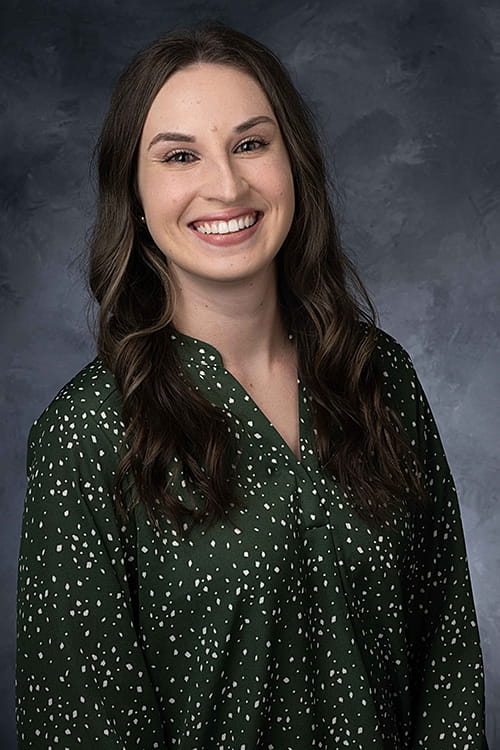
Kimberly Fiock, PhD student, pathology
Traces protein pathways in dementia
“Kimberly has an extensive CV full of scientific accomplishments, outreach activities, and advocacy work…All this, and so much more, makes Kimberly the perfect person to highlight the extraordinary talent we have at the University of Iowa.” -Marco Hefti, assistant professor of pathology
Hometown: Scottsdale, Arizona
Faculty mentor/advisor: Marco Hefti, MD, assistant professor, pathology, Carver College of Medicine
What is your degree program and expected graduate date? I am a PhD candidate in the experimental pathology PhD subprogram through the Biomedical Science Program and expect to graduate in 2023.
Please describe your research: I research a protein called tau that is important for normal brain development. As individuals age, tau can become toxic to cells, which leads to the development of a group of different neurodegenerative diseases, including Alzheimer’s disease. My work uses real human brain tissue and human cells to understand how tau affects different types of cells in different areas of the brain, which ultimately determines which disease an individual gets. I also try to better understand the ways in which tau is important for brain development and whether the loss of those functions explains why some individuals develop a disease.
In simple terms, why does this research matter? With a tripling in the number of cases of neurodegenerative diseases caused by tau predicted over the next three decades (affecting roughly 139 million people), research focused on preventing tau from becoming toxic is more important than ever. By understanding what makes each disease different on a cellular level, we can work to develop treatments that are specific to each disease and, ultimately, slow down the development of Alzheimer’s disease and related dementias.
How soon after starting at the University of Iowa were you able to participate in research? Right away! I was able to begin the research for my project as soon as I started in the Hefti lab.
How has being involved in research made you more successful at the University of Iowa? Being involved in research at the University of Iowa has allowed me to grow both personally and professionally. I’ve learned that I have a passion for educating others and organizing community outreach efforts, as well as communicating about my field to non-scientists through social media platforms like Instagram. I’ve also developed skills in working with human tissue and specialized human cells that have helped me build confidence in my abilities as a scientist and set me up for a successful career in research.
What are your career goals and/or plans after graduation? My goal is to become the co-director of a brain tissue repository (brain bank) while working as a staff scientist in academia. I also hope to teach graduate students about the importance of neuropathology and continue my outreach efforts to inspire the next generation of neuroscientists.
Banner location: not on display—
